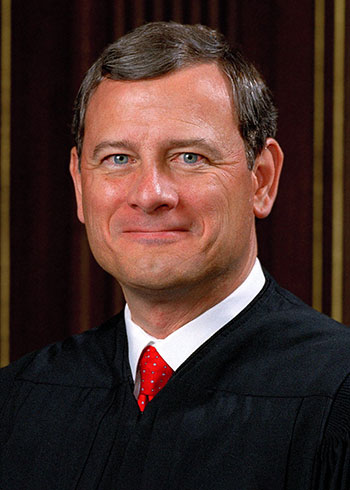Spotlight
2024 Year End Report on the Federal Judiciary

U.S. Supreme Court Chief Justice John G. Roberts recently released the annual report on the federal judiciary, noting that criticism of the judiciary is not a threat to democracy.
“To the contrary, public engagement with the work of the courts results in a better-informed polity and a more robust democracy,” Chief Justice Roberts wrote. “Indeed, when working in panels, judges themselves join from time to time the ranks of critics through concurring and dissenting opinions.”
However, Roberts observed, “not all actors engage in ‘informed criticism’ or anything remotely resembling it.”
“I feel compelled to address four areas of illegitimate activity that, in my view, do threaten the independence of judges on which the rule of law depends: 1) violence, 2) intimidation, 3) disinformation, and 4) threats to defy lawfully entered judgments.”
Source: uscourts.gov
Good Idea
Sports Betting in Wisconsin: Where Are We Now?

If you’re a college basketball fan, you probably filled out a NCAA basketball bracket and then watched as it all fell apart (or maybe not).
Wisconsin law still prohibits sports betting, unless you place those wagers in tribal casinos that allow it under compacts with the state. There are 11 federally recognized tribes in Wisconsin.
“Of these, nine tribal nations have reached agreements with the state to amend their gaming compacts to authorize sports wagering as of Dec. 30, 2024,” according to a report from the Wisconsin Policy Forum. “As of that date, six of those tribal nations – the Oneida Nation, St. Croix Chippewa Indians of Wisconsin, Sokaogon Chippewa Community, Forest County Potawatomi, Lac Courte Oreilles Band, and Lac du Flambeau Band – had sports gaming operations up and running in a total of 12 casinos throughout the state.”
Got a Nugget to Share?
Send your ideas for interesting facts, trends, tips, or other bits and bytes to wislawmag@wisbar.org, or comment below.
By the Numbers
346%
The percentage increase of civil cases pending more than three years, between March 2004 and March 2024, according to U.S. Courts. Judge Timothy M. Tymkovich, of the U.S. Court of Appeals for the Tenth Circuit, brought these statistics to light when urging Congress to create new federal district court and court of appeals judgeships to meet growing workload demands.
“Substantial delays chip away at the public’s respect for the judiciary and erode public confidence in the judicial process and the timely administration of justice,” Tymkovich wrote in his prepared testimony. “The problem is so severe that potential litigants may be avoiding federal court altogether, not having the resources or time to wait for their case to be heard or resolved. One cannot imagine the situation will improve on its own, without additional judges.”
According to U.S. Courts, “District court filings have grown by 30 percent since 1990, when the last comprehensive judgeship bill was enacted. Since 1991, the overall number of authorized district court judgeships increased by only four percent.”
Quotable
“If we can show younger lawyers what rural people truly value, perhaps they can see the advantages of being part of a strong rural community. Perhaps that will incentivize them.”
– Stephen Embry, in the article, “How a SXSW Panel Should Make Us Rethink the Legal Profession’s Rural Crisis,” published in Above the Law.
While technology can connect urban lawyers with rural clients – often discussed as a solution for so-called rural deserts in the legal profession – the SXSW panel revealed that rural communities don’t want remote lawyers. They want lawyers who live and work in their own communities.
“Rural folks have a commitment to the community and to each other,” Embry wrote. “Life is much less transit in the rural community so there is a greater sense of investment in it. And importantly for seeking solutions to the legal desert problem, you can’t buy your way into the community. You have to be part of it. You have to show up for people, you have to demonstrate you accept and are part of the community. You have to earn it.”
The State Bar of Wisconsin recently introduced the Rural Practice Development Program. This program presents a unique opportunity for attorneys to relocate to underserved rural communities, establish or join a practice, immerse themselves in local life, and receive a financial stipend of $10,000.
From the Archives
Disorderly Conduct in Wisconsin: Topping the Charts
From 2018 to 2024, prosecutors filed more than 195,500 charges of misdemeanor disorderly conduct in Wisconsin circuit courts, the most of any other criminal or traffic charge. In the last five years, 46%-48% of those charges were dismissed. Disorderly conduct involves “violent, abusive, indecent, profane, boisterous, unreasonably loud or otherwise disorderly conduct under circumstances in which the conduct tends to cause or provoke a disturbance,” under Wis. Stat. § 947.01(1).
Bail jumping-felony (171,184) was next in line, followed by bail jumping-misdemeanor (158,127). Then came speeding on the freeway (149,938), operating while revoked (118,443), speeding in 55 MPH zone (102,323), failure to wear a seatbelt (81,556), possession of drug paraphernalia (79,455), and operating while under the influence (78,584).
Source: wicourts.gov
» Cite this article: 98 Wis. Law. 7 (April 2025).
